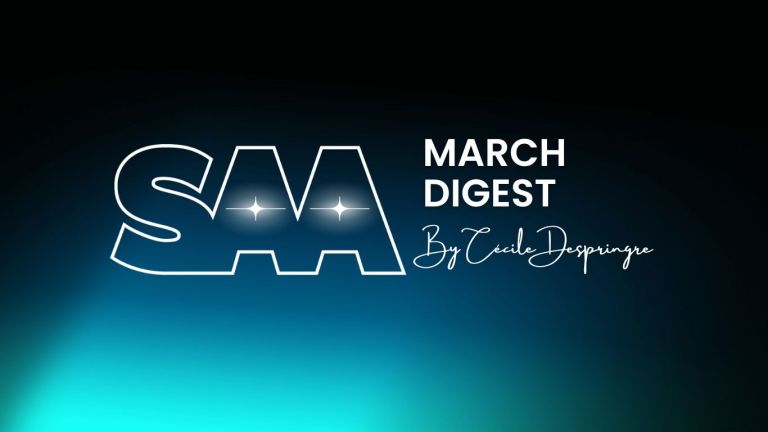Secretary General's March Digest, 2025

AI and the EU Code of Practice, preparing for our co-organised side event in Geneva, meeting with MEPs and news from the SAA Board of Patrons. Read SAA Secretary General Cécile Despringre's March digest.
First, in March the SAA welcomed Inés París as an addition to our Board of Patrons - film directors and screenwriters from across Europe who support the SAA's mission. Inés is a Spanish director and screenwriter, working in film, documentary and TV series. She is the Deputy Chair of the SGAE Audiovisual College and was the first Chairperson for CIMA (Spanish Audiovisual Women's Association) and the first woman to chair the SGAE Foundation.
Secondly, I invite you to watch our video interview with our Patron Katharina Mückstein. Katharina is an Austrian screenwriter and director who shares her story, her challenges and perspective on gender and diversity in the audiovisual sector, as well as her valuable advice for women in the sector and for policy makers. We also published a short clip with her on our social media, talking about the impact of AI (see here on Instagram).
Finally, we also welcome Paola Bellissens, a Master student from the University of Aix-Marseille, who is doing her internship with us until the summer. Every semester, we take time to train students in public affairs, EU monitoring of copyright and media policies and communication so that they gain practical experience in the European audiovisual landscape and support our team. Most of our former interns are now in employment, and many of them in the EU audiovisual affairs, which makes me particularly happy!
On the EU front
This month, like the previous one, was a lot about AI. I was invited by the Hellenic Copyright Organisation to a conference in Athens to mark their 30th anniversary. Many prominent copyright experts gave valuable presentations on copyright and AI, while I participated in a roundtable on copyright and collective management in the age of AI. You can read my intervention here (and on social media).
The third draft of the general-purpose AI models’ Code of Practice was published on 11 March. With my colleague Luisiana, our Legal and Policy Officer, we prepared comments that we discussed with the SAA members and legal experts in an online meeting of the SAA AI working group on 21 March.
On the same day, I had the opportunity to speak at the online meeting of the WG1 on Copyright chaired by Alexander Peukert and Céline Castets-Renard and organised by the AI Office of the EU Commission. I delivered a short, to-the-point statement. You can read it on my LinkedIn. In brief, I expressed our strong disappointment with the third draft. Not only does it repeat the problems we highlighted with the previous drafts, in particular the lack of encouragement to AI companies to seek for licences, but the over-simplification of the third version now increases the exposure of AI companies to litigation. My intervention was much appreciated by our colleagues representing rightsholders in the cultural and creative sectors, many whom agreed that we would be better off without the Code of Practice in its current form. Altogether we expressed our concerns in a joint statement published today.
Many members of the European Parliament also share these concerns. We met with Emma Rafowicz (FR/S&D), Vice-Chair of the Culture Committee, who told us that not even she and her colleagues had been kept informed of the drafting process of the Code of Practice. She is a very promising and committed MEP who understands our issues and who we trust will carry the voice of audiovisual authors and the creative sector.
In addition, with my colleagues we were busy preparing for the SAA general assembly meeting on 1-2 April. We organised our online WG meetings on Retransmission on 4 March and on Copyright on 17 March and prepared all the documentation and practicalities for such an annual meeting with the SAA members.
On the global stage
My colleague Annica and I spent a lot of time preparing for our side event “Beyond the Credits: Strengthening Audiovisual Authors’ Rights” on 9 April in Geneva, organised together with CISAC and FESAAL at the 46th Session of the WIPO Standing Committee on Copyright and Related Rights (SCCR). You are welcome to participate online or in person. Read more and register here. This event aims at supporting a decision by SCCR to launch a mapping study on the audiovisual authors’ rights and remuneration worldwide that would help policymakers understand the situation of audiovisual authors and existing remuneration mechanisms for the exploitation of their works on the different media.
Moreover, this month I attended the LUX Audience Award screening of "Intercepted" by Oksana Karpovych. A powerful and disturbing documentary that juxtaposes the landscape and scenery of Ukraine with recordings of phone conversations between Russian soldiers in Ukraine and their families back home, intercepted by the Ukrainian secret service in 2022.
Coming up
On Tuesday, we'll welcome our members to the SAA General Assembly meeting, and the next time you will hear from me, I'll have the pleasure of informing you about our newly elected Board of Directors, who will be guiding the strategic direction of the organisation for the next three years as we address authors' rights and the impact of generative AI, the uncertain regulatory environment, and the challenging political climate.
Until then, my best wishes for a sunny month of April. ☀️
Best regards,
